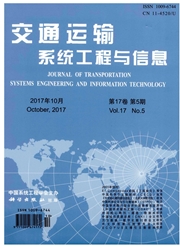

 中文摘要:
中文摘要:
考虑一条地铁将生活区和工作区连接起来,每天早晨通勤者乘地铁从生活区到工作区上班,在高峰期,通勤者人数众多,车内就产生了拥挤,从而必然有部分通勤者通过早出发或晚出发来避免车内拥挤.本文提出了一个考虑地铁车内拥挤和早到与迟到惩罚的通勤者出发时间选择模型,并研究了该模型的均衡性质以及个人出行总成本.在均衡状态,没有通勤者会选择在最早或最迟出发时间出行;均衡状态的出发率是出发时间的线性函数;在均衡状态,任意给定通勤者人数,最早或最迟出发时间的解是唯一的.最后,算例结果验证了理论模型的结论并揭示了出发率和相关参数之间的关系.
 英文摘要:
英文摘要:
Considering a subway connecting a resident area and a workplace, every morning, commuters use the subway for traveling from the residential area to the workplace. During rush hour, some commuters depart earlier or later for avoiding in-carriage congestion incurred by a large number of commuters. This paper presents a model for studying the subway commuters' departure time choice behavior and the private travel total cost. The in-carriage congestion and arrival early/late penalty are considered in the model. At equilibrium, no user starts on the latest or earliest departure time. The departure rate at equilibrium state is linear to departure time. At equilibrium, for any given number of commuters, the solutions to the latest and earliest departure time are unique. Finally, numerical results are used to verify the analytical findings and explore the relationship between departure rate and some model parameters.
 同期刊论文项目
同期刊论文项目
 同项目期刊论文
同项目期刊论文
 Equity and efficiency analysis of pricing strategies in a bi-modal network with heterogeneous user g
Equity and efficiency analysis of pricing strategies in a bi-modal network with heterogeneous user g Modeling the evolutions of day-to-day route choice and year-to-year ATIS adoption with stochastic us
Modeling the evolutions of day-to-day route choice and year-to-year ATIS adoption with stochastic us Modeling time-dependent travel choice problems in road networks with multiple user classes and multi
Modeling time-dependent travel choice problems in road networks with multiple user classes and multi One-step solution fabrication of magnetic chains consisting of jingle-bell-shaped cobalt mesospheres
One-step solution fabrication of magnetic chains consisting of jingle-bell-shaped cobalt mesospheres Support vector machine forecasting method improved by chaotic particle swarm optimization and its ap
Support vector machine forecasting method improved by chaotic particle swarm optimization and its ap Static floor field and exit choice for pedestrian evacuation in rooms with internal obstacles and mu
Static floor field and exit choice for pedestrian evacuation in rooms with internal obstacles and mu A model for evaluation of transport policies in multimodal n etworks with r oad and p arking capacit
A model for evaluation of transport policies in multimodal n etworks with r oad and p arking capacit 期刊信息
期刊信息
